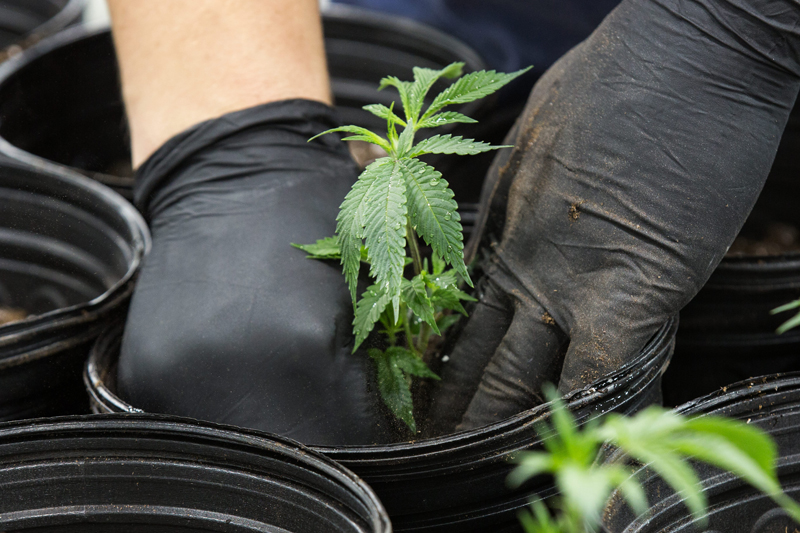Four U.S. states have legalized recreational cannabis, and another four will follow after ballot victories last November.

Legal pot in permissive states depends on a tolerant attitude from Washington, though. And the same election that doubled the number of states where pot is (or will be) legal brought in an administration with a chilly attitude to recreational marijuana. Attorney-General Jefferson Sessions, for example, told Congress last year that “we need grownups in charge in Washington to say marijuana is not the kind of thing that ought to be legalized.”
On Thursday, White House spokesperson Sean Spicer delivered another reminder that the party may be ending.
“I think that when you see something like the opioid addiction crisis blossoming in so many states around this country, the last thing that we should be doing is encouraging people,” Spicer told reporters. “There is still a federal law that we need to abide by … when it comes to recreational marijuana and other drugs of that nature.”
Immediately, Canadian cannabis stocks plunged, bottoming out on Friday morning. Investors sold marijuana producers Aurora, Aphira, OrganiGram and Canopy Growth, which lost between three per cent and nine per cent of their value.
WATCH: Colorado’s governor condemns a potential crackdown on legalized marijuana by the Trump administration. Colorado is one of eight states, along with the District of Columbia, that allows recreational marijuana.

- Honda expected to announce Ontario EV battery plant, part of a $15B investment
- Trudeau says ‘good luck’ to Saskatchewan premier in carbon price spat
- Canadians more likely to eat food past best-before date. What are the risks?
- Hundreds mourn 16-year-old Halifax homicide victim: ‘The youth are feeling it’
By mid-day Monday, some had recovered much of their value, but others hadn’t.
The selloff was clearly linked to Spicer’s comments, but Bruce Linton, CEO of Smith’s Falls, Ont., cannabis producer Canopy Growth, says it puzzles him.
READ: Legal pot in Canada could sell for $5 a gram — or less
“The reason I thought our stocks would go up is that capital knows that they have to invest in Canada if they want to catch on to the global evolution of the marijuana policy world.”
“It is baffling that that would be viewed as anything other than confirming that there aren’t U.S. competitors coming along any time soon.”
U.S. federal law bans marijuana — selling it, possessing it, producing it. But former president Barack Obama’s White House took a lenient attitude to states that legalized recreational pot, telling federal prosecutors to turn their attention elsewhere.
Linton calls the selloff “the excitement of the week, rather than a practical concern.”
READ: Smelly, fussy, humid: Why you may not want to grow your own legal pot
It could turn out that way.
For Canada, the Trump administration’s hostility to recreational pot could go in two directions.
Linton has argued that a chillier climate for legal marijuana in the U.S. is an opportunity for Canadian producers, who can offer investors a fully legal environment in which to develop recreational and medical cannabis.
READ: Why Donald Trump could be the Canadian marijuana industry’s secret weapon
But that’s not the only way things could turn out.
Trump has picked fights with a growing list of countries, from Germany to Australia, and it’s hard to imagine that Canada will avoid being a target forever. And a Trump White House that wanted to pick a fight with Canada could hardly find a better one than over legal marijuana.
Canada borders 13 states — in 10 of them pot will be illegal at the state level for the foreseeable future, while after legalization it will be freely available in Canada. Inevitably, some will leak over the border, and it’s possible that we may see some of the organized smuggling, often tied to organized crime, that was linked to prohibition of alcohol in the 1920s.
READ: Legal marijuana in Canada could slow border crossings, expert fears
A cross-border trade expert we talked to last fall feared that legalization could thicken and slow border crossings with goodwill on both sides.
“Mr. Trump is good at stirring it up, but I don’t see this on the priority list,” Linton says.
And Trudeau, he points out, could hardly be more committed to legalization:
“Mr. Trudeau isn’t Mr. Trump, and his first key promise, on being selected leader, is that he was going to make this happen. I don’t think it’s something that they can actually jeopardize the implementation of in order to do anything other than not get elected again.”


Comments